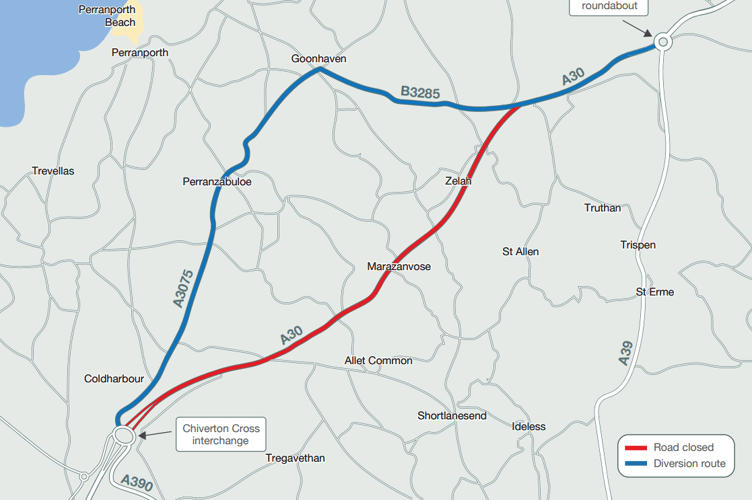Work still step up along the A30 and the new Carland junction later this month as part of National Highways’ A30 Chiverton to Carland Cross road upgrade in Cornwall.
The work will see the last major closures until after the summer holiday period, and to enable a series of road tie-ins, major earthworks and a traffic switch at Chybucca to be completed, the A30 will be closed between the temporary Chiverton interchange and Boxheater over the weekend of Friday, July 14, to Monday, July 17.

During the weekend closure, from 8pm on the Friday until 6am on the Monday, all traffic will be diverted the B3285 and the A3075.
Over the weekend, the B3284 southbound will be open at the Chybucca interchange where drivers will be able to turn left only onto the A30 (westbound) towards the new Chiverton interchange.
During the following week, the A30 will also be closed, overnight only, from Monday, July 17, to Friday, July 21.
This will be for the next major milestone for the project as a new temporary link from Carland Cross to the A30 is introduced to prepare for the construction of a flyover later in the year as part of the new junction.
During the weeknight closures, the A30 will be closed between the new Chiverton interchange and Carland Cross from 8pm to 6pm each night. All through traffic will be diverted via the A3076/A3058 and the A3075. And local traffic will be able to use the A39 to and from Truro as usual.
Neil Winter, National Highways’ Senior Project Manager for the A30 scheme, said: “We acknowledge these closures will have an effect on people’s journeys, and we understand roadworks can be frustrating, but we need these weekend and overnight closures to progress vital work along the whole route before the start of the summer holiday.
“We’ll also be completing work at the Carland Cross end of the scheme, and unlike the temporary Chiverton interchange, drivers won’t see too much change to their journeys.
“They’ll be taken around the existing Carland Cross roundabout via a new alignment to continue their journeys along the A30.
“Following the opening of the new Chiverton interchange we’re aware that there has since been additional congestion in comparison to the old Chiverton roundabout.
“This is a temporary layout and it is the first stage in delivering a new grade separated junction with a flyover to be constructed later this year, which will separate A30 traffic from local traffic.
“While there has been some improvement as drivers have got used to the new, temporary layout, we have also added extra signage and installed two sets of traffic signals and additional signage at the A30 westbound entry to the interchange.
“These measures will be carefully monitored and we will continue to do what we can to minimise congestion as we deliver this major highway upgrade for Cornwall.
“In the meantime, we’ve been communicating the forthcoming closures to local communities and businesses, more information is available on our website, and we thank drivers in advance for their patience while the work takes place.”
As part of the traffic management changes around the temporary Chiverton layout, the A390 filter lane will be managed so that the lights operate as effectively as possible.
The traffic signals are currently being manually operated to allow flexibility in management of traffic and will be operational weekdays from 7am to 7pm only, with scope for weekend operation too.
The extra signage has been installed in various locations around the temporary Chiverton interchange layout, including the St Agnes/Blackwater road, which also has single carriageway directional signing, solid white lining and ‘keep left’ markings to guide drivers.
The new A30 carriageway is scheduled to be opened in winter 2023/24, and in the meantime more information and further scheme updates are available at www.nationalhighways.co.uk/a30chiverton
The cost of developing the scheme is being partly funded by an £8 million contribution from the European Regional Development Fund, with an additional £12-million for the construction phase. The remainder of the cost of developing and delivering the scheme is being funded by central Government.




